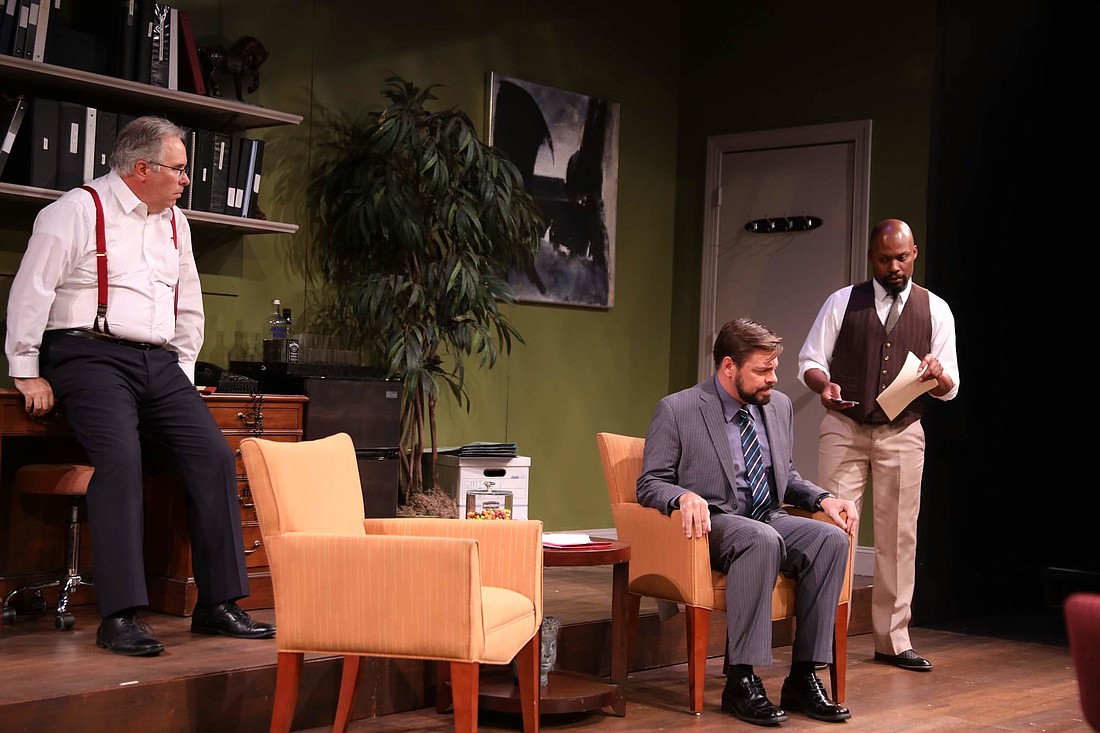- March 12, 2025
-
-
Loading

“Let’s talk about race.” In contemporary America, you might as well say, “Let’s take a walk through a minefield.” But despite the clear warning signs, David Mamet bravely tackles this explosive topic in “Race.” His gutsy, flawed, entertaining, infuriating, punch-drunk play is now on stage at Venice Theatre.
“Race” opens with the kind of red-meat, potboiler premise that made Mamet a big name. A white billionaire named Charles Strickland (Chris Hines) walks into a law office of Lawson & Brown, a high-end criminal defense practice. This well-heeled individual desperately needs their legal expertise. A young black woman has accused him of raping her in an upscale hotel room. Charles claims she’s lying and the sex was consensual. (He’s married, by the way.) To dig his grave deeper, the couple in the adjoining room heard him bellowing unprintable racist obscenities before the sexual encounter. (That explains why Charles’ previous law firm dropped his case. Juries hate that kind of thing.) More racist slurs emerge from the man’s past. Ah, but the woman was wearing a sequined dress! She claims Charles ripped it from her body before raping her, but the police report omitted mention of any sequins on the floor. And with that, we’re off to the races.
That bare summary only hints at the tangle of philosophical, legal, cultural and personal issues Mamet tackles in his play. At times, it feels like two plays. Each act has a wildly different tone.
The hilarious first act is a cynical (or Socratic) indictment of America’s legal system. This indictment is stated by the law firm’s two senior partners — the white Jack Lawson (Chris Caswell) and the black Henry Brown (Kristofer Geddie). Susan (DaNiesha Carr) is a newbie. She mostly keeps her mouth shut, but she’s clearly thinking unhappy thoughts.
Seasoned attorneys that they are, Jack and Henry don’t care if Charles is guilty or not. What is truth? Who cares? As they see it, their job is to plant a juicy narrative in the jury’s collective mind. The prosecution fills the jurors’ heads with a lurid shocker about a powerful white man raping a helpless black woman. The defense team needs to drive that story out of their skulls. And replace it with an even juicier story that gets their client off the hook.
The scathing second act unloads more red herrings than a Swedish fishing boat. Naming them would open up a can of spoilers, so I won’t. Suffice to say: Susan questions whether the law firm is an equal opportunity employer. Jack questions her loyalty. Let’s move on.
Kelly Woodland’s direction is as brisk as a good prizefight. It’s a two-act play, but she stages it sans intermission in 75 minutes. Mamet being Mamet, it’s a talky drama — and most of the words are fighting words. (90% legal arguments. 10% ordinary arguments.) Woodland makes sure you can follow the arguments. She keeps Mamet’s machine-gun fire dialogue crisp and clear, with enough overlaps and pauses to avoid a phony sense of artifice.
Caswell is suitably brainy and bossy as the white lawyer. The wheels are always turning in his mind. He comes off as a cold cynic at first, and then reveals something resembling a heart. Geddie’s African-American attorney sees Jack’s blind spots. He loves throwing darts at his partner’s inflated ego.
Carr’s character, Susan, sees through both the senior partners — or thinks she does. What’s Susan thinking? Carr grips you with that question with her hints of fiercely controlled rage. Her character is clearly up to something. Susan does a slow burn until she finally boils over and the truth comes out. Hines' portrayal of the poor little rich boy misses the mark. Charles is supposed to be a charismatic celebrity, but Hines doesn’t quite sell it. He’s too nice, and oddly contrite. If Charles is a rapist facing ruin, he’s just not scared enough. If he’s been wrongly accused, he’s not outraged enough. His character just doesn’t add up. To be fair, most of the bad math is in the script.
Tim Wisgerhof’s set is a no-nonsense, utilitarian office. The law firm of Lawson & Brown isn’t trying to impress you. They don’t have to. Adam-Bobby Farman’s costumes evoke the dress-for-success style of the rich and famous. Or infamous.
Don’t get me wrong. This is a smart, highly entertaining play — and laugh-out-loud funny, especially in the first act. And give the pugnacious playwright credit. Mamet’s subject matter is a gutsy choice. Especially for a white guy.
Race is the third rail of the American experience, after all. Mamet chooses to dance around it. Bravo! He’s a brilliant dancer. But as a fighter, he pulls his punches, at least in this play. If you’re hungry for food for thought, this is the play for you. Mamet raises some powerful questions. If you’re looking for powerful answers, keep looking.